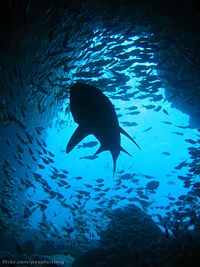Welcome to Citizendium: Difference between revisions
imported>Caesar Schinas mNo edit summary |
imported>Caesar Schinas (automatically change quotation every month) |
||
| Line 32: | Line 32: | ||
|style="vertical-align:bottom; overflow:hidden;"| | |style="vertical-align:bottom; overflow:hidden;"| | ||
<div style="background-color:lightyellow; border:1px solid grey; font-size:small; text-align:left; padding:1em; max-width:25em; float:right;">< | <div style="background-color:lightyellow; border:1px solid grey; font-size:small; text-align:left; padding:1em; max-width:25em; float:right;"> | ||
'''Share your knowledge. It's a way to achieve immortality.'''<br /> | {{#switch:{{CURRENTMONTH}} | ||
—Jackson Brown and H. Jackson Brown, Jr., ''Life's Little Instruction Book'' | |01 = '''I was brought up to believe that the only thing worth doing was to add to the sum of accurate information in the world.'''<br />—[[Margaret Mead]] | ||
''' | |02 = '''No man is wise enough by himself.'''<br />—[[Titus Maccius Plautus]] (254 BC - 184 BC), ''Miles Gloriosus'' | ||
— | |03 = '''Share your knowledge. It's a way to achieve immortality.'''<br />—Jackson Brown and H. Jackson Brown, Jr., ''Life's Little Instruction Book'' | ||
'' | |04 = '''Knowledge is power.'''<br />—[[Sir Francis Bacon]] (1561 - 1626), ''Religious Meditations, Of Heresies'' | ||
|05 = '''Knowledge is the true organ of sight, not the eyes.'''<br />—From the [[Panchatantra|Panchatantra]] [http://www.britannica.com/EBchecked/topic/440899/Panchatantra (Indian literature)] | |||
'''Knowledge is the true organ of sight, not the eyes.'''<br /> | |06 = '''It is no good to try to stop knowledge from going forward. Ignorance is never better than knowledge.'''<br />—[[Enrico Fermi]] (1901 - 1954) | ||
—From the [[Panchatantra|Panchatantra]] [http://www.britannica.com/EBchecked/topic/440899/Panchatantra (Indian literature)] | |07 = '''The ink of the learned is equal in merit to the blood of the martyrs.'''<br />—[[Louis de Bernières]], ''Birds Without Wings'' | ||
''' | |08 = '''There is only one good, knowledge, and one evil, ignorance.'''<br />—[[Socrates]] (469 BC - 399 BC), ''Diogenes Laertius, Lives of Eminent Philosophers'' | ||
—[[ | |09 = '''Trust yourself. You know more than you think you do.'''<br />—[[Benjamin Spock|Dr. Benjamin Spock]] (1903-1998) | ||
''' | |10 = '''If knowledge can create problems, it is not through ignorance that we can solve them.'''<br />—Isaac Asimov (1920 - 1992) | ||
—[[ | |11 = '''A little knowledge that acts is worth infinitely more than much knowledge that is idle.'''<br />—[[Kahlil Gibran]] | ||
''' | |12 = '''If you have knowledge, let others light their candles in it.'''<br />—[[Margaret Fuller|Margaret Fuller]] (1810-1850) | ||
—[[ | }} | ||
''' | |||
— | |||
''' | |||
— | |||
''' | |||
— | |||
</div> | </div> | ||
|} | |} | ||
Revision as of 01:28, 31 May 2009
|
Article of the Week [ about ] (CC) Photo: Richard Ling This grey nurse shark (Carcharias taurus) and the smaller fish surrounding it are animals. Animals (from the Latin animale and animalis, meaning "living", and anima, meaning "vital breath", or "soul") are those organisms classified into the kingdom Animalia. Together they make up a wide segment of life—biologists estimate their species to number many millions—and include an incredibly diverse array of both familiar and strange creatures, ranging from hawks to humans and from sea slugs to spiders. Nonetheless, they all share certain characteristics: all animals are multicellular eukaryotes, ingest their food, and move by their own power at some point in their life cycle. Animals are essential consumers in many ecosystems and many are also important in human societies and economies. DefinitionLike "plant", the term "animal" has gone through several definitions along history. Animals—moving life—were distinguished from plants—unmoving life—by Aristotle in his works on metaphysics and logic. Aristotle continued to influence classification of plants all the way to Carl Linnaeus, who divided all life into the two kingdoms Animalia and Vegetabilia. Some animals such as coral were considered plants because they appeared sessile and similar to plants' branches. Additionally, many protists were formerly classified as "microscopic animals" because, like animals, they actively moved and ate other organisms.[more...]
New Draft of the Week [ about ]The modern Taliban (طالبان; from the Farsi plural of Arabic طالب, meaning "student") movement, or the Taliban Islamic Movement of Afghanistan (TIMA), took control of Afghanistan in 1994, imposing a strict Salafist rule, as or more conservative than the Wahhabi movement of Saudi Arabia. Both featured a "Department for Promoting Virtue and Preventing Vice." They argued they were creating a stable Islamic state that the leaders of the jihad against the Soviets could not create. [1] At the present time, the modern Taliban forms a substantial part of the insurgency in the Afghanistan War (2001-), as well as an active insurgency in Pakistan. The Taliban historically had a strong presence in the Federally Administered Tribal Areas near the border between Pakistan and Afghanistan. After continuing fighting in areas along the Afghan border, Pakistan negotiated with Taliban fighters. [2] Fighting continued, and, on May 7, 2009, Prime Minister Yousef Raza Gilani of Pakistan formally revoked a peace agreement with the Taliban, accusing the Taliban of repeated violations. Taliban forces had fought to within 60 miles of Islamabad, the capital of Pakistan. [3] [more...] | |||||||||||||
A rapidly developing encyclopedia project—and more!
Learn about us
Important new community pages
Support us
|
- ↑ Ma'soum Afghani (April - May 1997), "The Spokesperson of the Taliban Government to Nida'ul Islam: "Our Goal is to Restore Peace and Establish a Pure and Clean Islamic State in Afghanistan"", Nida'ul Islam magazine
- ↑ Imran Khan (March 10, 2009), "Talking to the Taliban", AlJazeera.net
- ↑ "Prime minister: Pakistan fights for 'honor and dignity'", CNN, May 7, 2009
